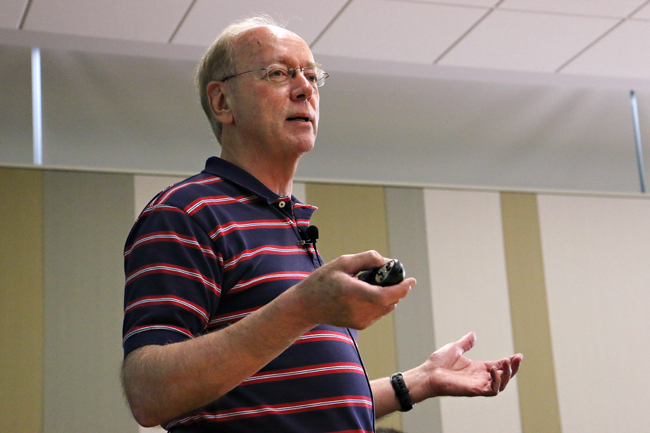Kenneth Land, sociology professor at Duke University, discussed the social indicators movement during a lecture at the Population Research Center’s “Brown Bag Seminars” on Friday.
According to Land’s research, “The Sociology of Social Indicators,” social indicators include unemployment rates, crime rates and measures of subjective well-being as a whole. Land, co-director of the Center for Population Health and Aging at Duke, said he wanted to use feedback from the lecture to further his new research, which he hopes to have published next year.
“When ‘Social Indicators’ was published in 1966, it came out during the time of the space race,” Land said. “During all of this, the American Academy of Arts and Sciences worked with NASA to detect and anticipate the consequences the space program could have on society. Because of the lack of data at hand, this helped develop the idea of indicators.”
Land also discussed the general development of social indicators by showing their impacts in the different decades.
“During the ’70s, you have lots of data systems being initiated,” Land said. “In the ’80s, there was a concern that the field was dying. By the 1990s and the 2000s, there is a revival and
expansion.”
Part of the reason for the expansion is because of the study on the quality of life, according to Land. From that idea, Land said social indicators can now be measured through the Human Development Index, also known as HDI. The index most commonly measures the human life expectancy after birth, years of schooling and living standards.
Land said economists are finally accepting the impact of people’s happiness on the economy.
Land also discussed the negative consequences that developments such as technology and the top-1 percent can have. The impact of the top-1 percent is an important aspect in his current research.
Jim Walker, director of sustainability at UT, said he enjoyed the lecture.
“I thought this was a good turnout,” Walker said. “I thought it was interesting how Land was able to take the University research and implement it into the community.”
Sociology professor Robert Hummer said Land’s work has helped provide specific information on social changes.
“It was a great and interesting lecture,” Hummer said. “In terms of what Land has done for our field, he has shown how to better understand, measure and assess social changes. In his research, I would like to see Land really bring out the extreme wealth and show the broad measure on society.”




















